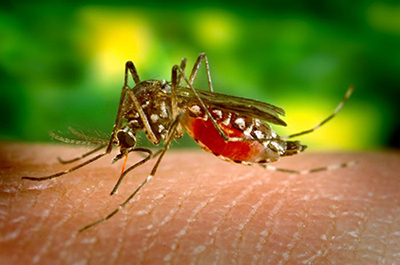 Purdue University - Extension - Forestry and Natural Resources
Purdue University - Extension - Forestry and Natural Resources
Got Nature? Blog

Photo by: James Gathany, Center for Disease Control and Prevention
You may have likely heard of the Zika virus at this point – a new infection on the rise that is drawing many parallels to the West Nile virus that caused 286 deaths in the United States in 2012. Like the West Nile, Zika was first discovered over sixty years ago and wasn’t considered to be a large concern until it reemerged unexpectedly years later. Both viruses are carried by mosquitos, and 80% of people infected display no symptoms and are at risk of unwittingly further spreading the infection. And most importantly, both viruses have no current treatment or vaccination and can be deadly.
When discussing the Zika virus, it is important to know that currently there have been no cases of infection in the continental U.S. While this means there is no need to immediately panic, transmission of diseases are often unpredictable as human population and global travel increase. Zika appeared in Brazil last May and has quickly spread to over 20 countries across Central and South America, causing the World Health Organization to declare the virus an international public health emergency, predicting that Zika could infect as many as 4 million people by the end of this year. With that ominous prediction looming over us, a good precaution to take is knowing how the mosquitos potentially carrying the virus can be controlled and avoided.
Simply avoiding mosquitos is an effective first step. Staying indoors during the daytime when mosquitos feed can help lessen exposure to mosquitos, as well as wearing long sleeves, pants, and U.S. Environmental Protection Agency-approved mosquito repellant when going outdoors.
Another preventative measure you can take is eliminating potential mosquito breeding sites from your area. Mosquitos breed in containers of standing water, and getting rid of them can reduce mosquito population in your area. Dog bowls, birdbaths, potted plants, and similar objects are all potential breeding grounds, and removing them means less places for mosquito eggs to hatch.
Again, the Zika virus isn’t currently an immediate concern for people in the United States, but this information is crucial to know as scientists learn more about how this virus is spread. At any rate, they’re also give good tips for avoiding annoying mosquito bites! To learn more, please check out the Purdue University Agriculture News article “Controlling and avoiding mosquitos helps minimize risk of Zika.”
Resources:
Controlling and avoiding mosquitos helps minimize risk of Zika – Purdue University Agriculture News
Zika virus and mosquito-borne disease experts – Purdue University News
Mosquitos – Purdue University Medical Entomology
Zika Virus – World Health Organization
Management of Ponds, Wetlands, and Other Water Reservoirs to Minimize Mosquitos – The Education Store, Purdue Extension Resource Center
Aaron Doenges, videographer & assistant web designer
Purdue Forestry and Natural Resources

Recent Posts
- Farmers Helping Hellbenders RCPP Program Accepting Applications
Posted: May 1, 2024 in Aquaculture/Fish, Forestry, How To, Wildlife, Woodlands - Extension Specialist Brian MacGowan Receives Hoosier Wildlife Award
Posted: in Forestry, Wildlife - MyDNR – First positive case of chronic wasting disease in Indiana
Posted: April 29, 2024 in Alert, Disease, How To, Safety, Wildlife - Publication – Introduction to White-tailed Deer Impacts on Indiana Woodlands
Posted: April 28, 2024 in Forestry, Land Use, Plants, Publication, Wildlife, Woodlands - Publication – Understanding White-tailed Deer and Their Impact on Indiana Woodlands
Posted: in Forestry, Land Use, Plants, Publication, Wildlife, Woodlands - Publication – Monitoring White-tailed Deer and Their Impact on Indiana Woodlands
Posted: in Forestry, Land Use, Plants, Publication, Wildlife, Woodlands - Publication – Managing White-tailed Deer Impacts on Indiana Woodlands
Posted: in Forestry, Land Use, Plants, Publication, Wildlife, Woodlands - Report Spotted Lanternfly – Purdue Landscape Report
Posted: April 10, 2024 in Alert, Forestry, Invasive Insects, Plants, Wildlife, Woodlands - Declining Pines of the White Variety – Purdue Landscape Report
Posted: in Alert, Disease, Forestry, Plants, Wildlife, Woodlands - Are you seeing nests of our state endangered swan? – Wild Bulletin
Posted: April 9, 2024 in Alert, Forestry, How To, Wildlife
Archives
Categories
- Alert
- Aquaculture/Fish
- Aquatic/Aquaculture Resources
- Ask the Expert
- Christmas Trees
- Community Development
- Disease
- Drought
- Forestry
- Forests and Street Trees
- Gardening
- Got Nature for Kids
- Great Lakes
- How To
- Invasive Animal Species
- Invasive Insects
- Invasive Plant Species
- Land Use
- Natural Resource Planning
- Nature of Teaching
- Plants
- Podcasts
- Ponds
- Publication
- Safety
- Timber Marketing
- Uncategorized
- Urban Forestry
- Webinar
- Wildlife
- Wood Products/Manufacturing
- Woodland Management Moment
- Woodlands